Key takeaways
- Virtue ethics emphasizes personal character development and lifelong growth rather than rigid rule-following or outcome-based evaluations.
- Aristotle’s concept of the “Golden Mean” suggests that virtue exists between extremes, promoting the idea of balance in moral behavior.
- In education, virtue ethics fosters character formation, encouraging qualities like honesty and empathy, which lead to better decision-making and personal resilience.
- The application of virtue ethics involves continuous self-reflection, focusing on the journey of becoming a better person rather than merely achieving specific ethical outcomes.
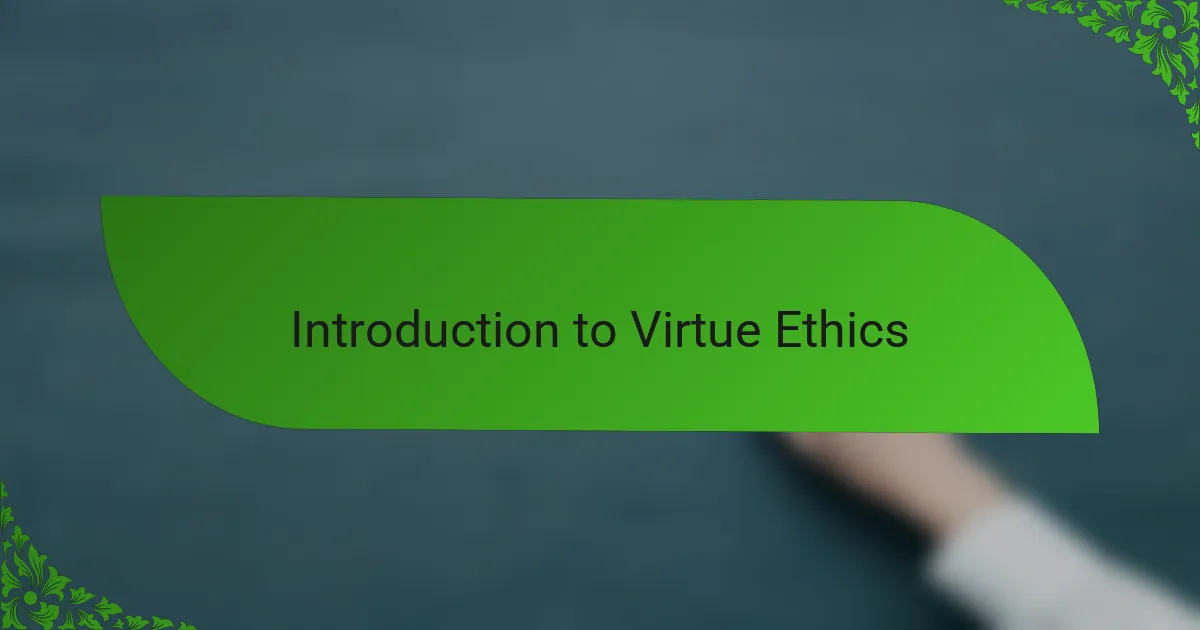
Introduction to Virtue Ethics
Virtue ethics, at its core, asks a simple yet profound question: what kind of person should I be? It’s not just about following rules or calculating outcomes, but about cultivating qualities that define good character. When I first encountered virtue ethics, it felt like a refreshing shift from the black-and-white nature of other ethical theories.
Thinking about virtues like courage, honesty, and compassion brings a sense of personal growth into ethics. Have you ever noticed how some traits just resonate deeply, guiding your choices even when logic seems unclear? For me, virtue ethics connects philosophy with everyday life, making morality something alive and practical rather than abstract.
This approach invites us to see ethics as a lifelong journey of becoming, not merely a list of do’s and don’ts. It challenges me to reflect on my habits and aspirations: am I nurturing virtues that lead to flourishing? That question alone makes virtue ethics feel both inspiring and deeply human.
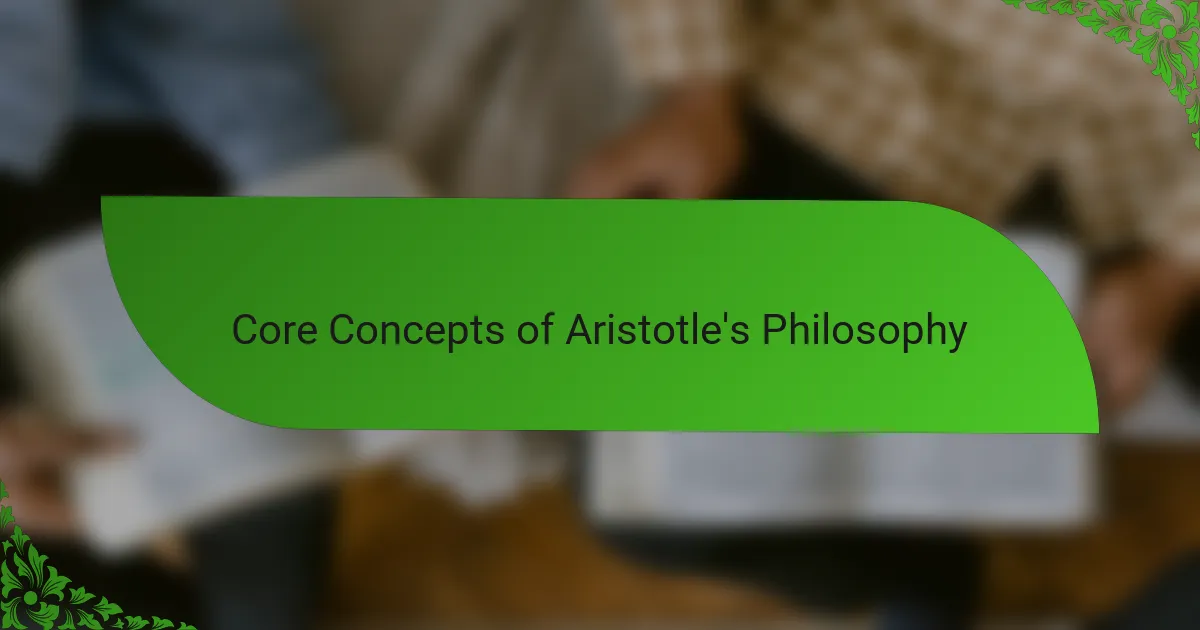
Core Concepts of Aristotle’s Philosophy
Aristotle’s philosophy centers on the idea that everything in nature has a purpose, which he calls its “telos.” I find this deeply insightful because it means understanding a thing’s true nature helps us determine what’s good for it. For humans, Aristotle argues, our purpose is to live a life of rational activity in accordance with virtue—something I’ve often reflected on when considering what makes life meaningful.
One concept that really strikes me is the “Golden Mean,” Aristotle’s idea that virtue lies between two extremes of excess and deficiency. It’s like walking a tightrope; too much courage becomes recklessness, too little becomes cowardice. This balance feels practical and relatable, reminding me of times when I’ve struggled to find moderation in my own actions.
Aristotle also emphasizes character development through habituation—forming good habits until they become second nature. I’ve noticed this in my own life; virtues aren’t innate but build up over time, shaped by repeated practice. It makes me wonder, how different would my ethical outlook be if I consciously focused on cultivating virtues every day?
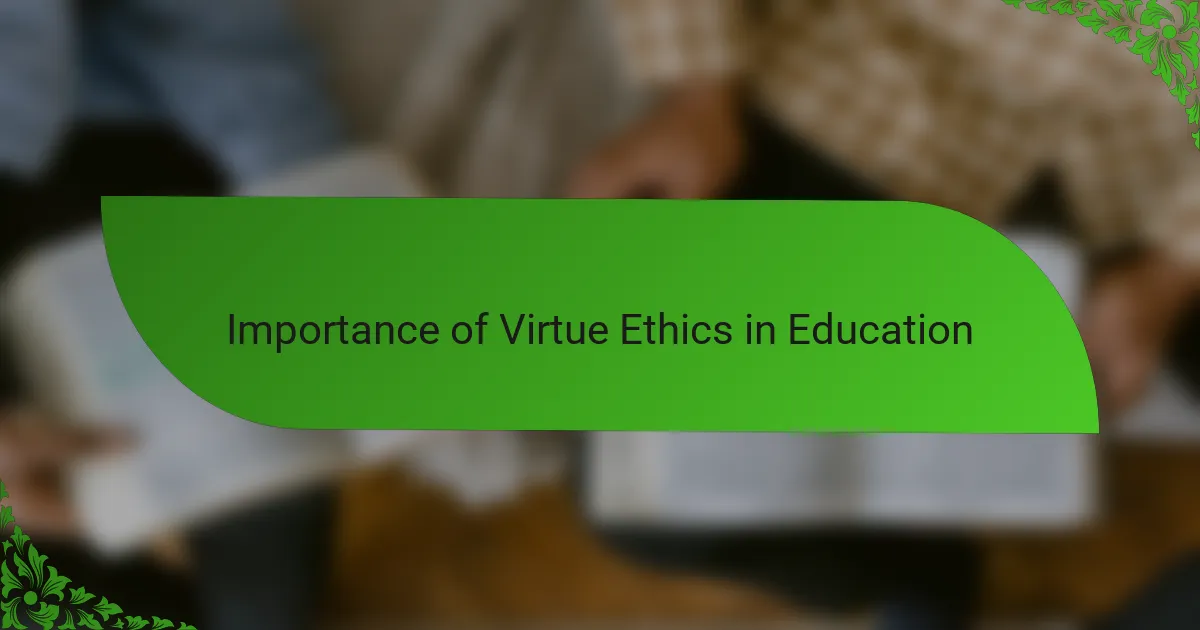
Importance of Virtue Ethics in Education
When I think about virtue ethics in education, what stands out most is how it shifts the focus from mere knowledge transmission to character formation. Have you ever noticed how students who develop qualities like honesty and empathy tend to navigate challenges more gracefully? I see virtue ethics as essential because it nurtures not just smarter minds, but better people.
Incorporating virtues into education feels like planting seeds that grow over a lifetime. I remember teachers who didn’t just teach subjects but modeled courage and kindness—those lessons stuck with me far more than any textbook content. Isn’t that the kind of education we all need, one where virtues become part of who we are?
What really strikes me is how virtue ethics encourages continuous self-improvement within learning environments. Instead of aiming for perfection, it embraces the journey of becoming, much like my own experience trying to develop patience and perseverance. Could this be why students who learn through virtue ethics often demonstrate resilience and a stronger sense of purpose?
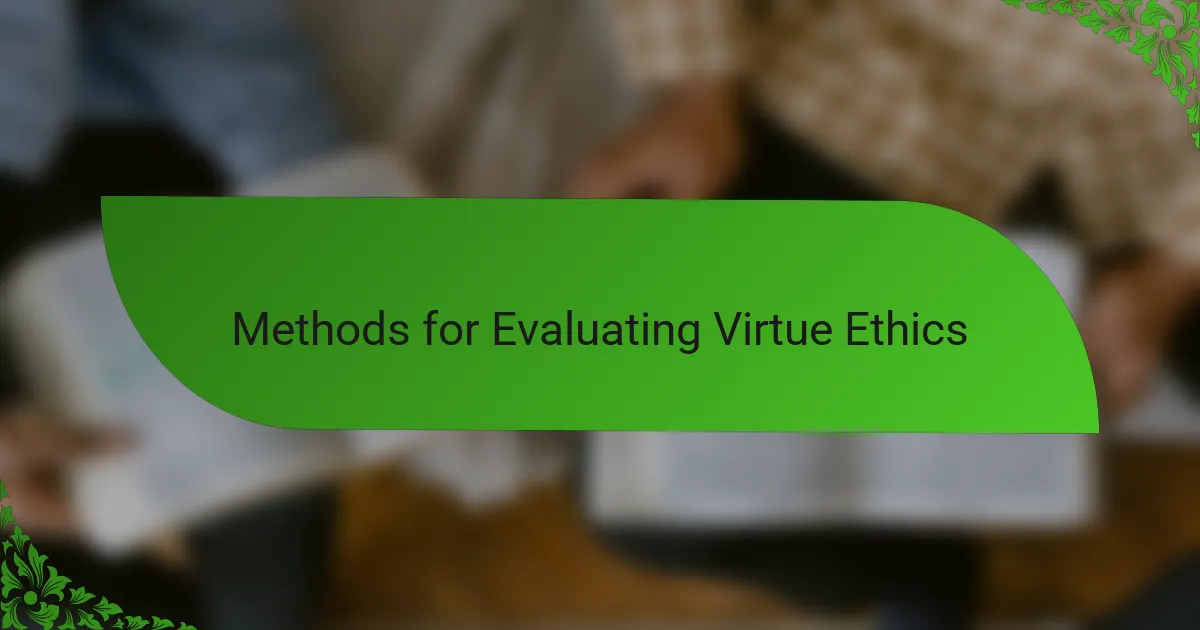
Methods for Evaluating Virtue Ethics
Evaluating virtue ethics often starts with examining how well it captures the complexity of human character. I’ve found that reflecting on personal experiences where virtues like honesty or courage guided my decisions reveals the theory’s practical depth. Doesn’t it feel more authentic to assess ethics through life stories rather than abstract rules?
Another method I rely on is comparing virtue ethics with other ethical frameworks to see where it shines or falls short. For example, while utilitarianism focuses on outcomes, virtue ethics demands we look inward, emphasizing who we are becoming. This contrast helps me appreciate how virtue ethics encourages continuous personal growth instead of just tallying right or wrong actions.
Finally, I think about how virtue ethics addresses moral dilemmas in everyday life—its flexibility or rigidity. Has there been a time when following a virtue wasn’t clear-cut? In those moments, virtue ethics pushes me to balance competing traits, like courage and prudence, which feels more human and relatable than strict rule-following. This ongoing negotiation testifies to the theory’s real-world relevance.
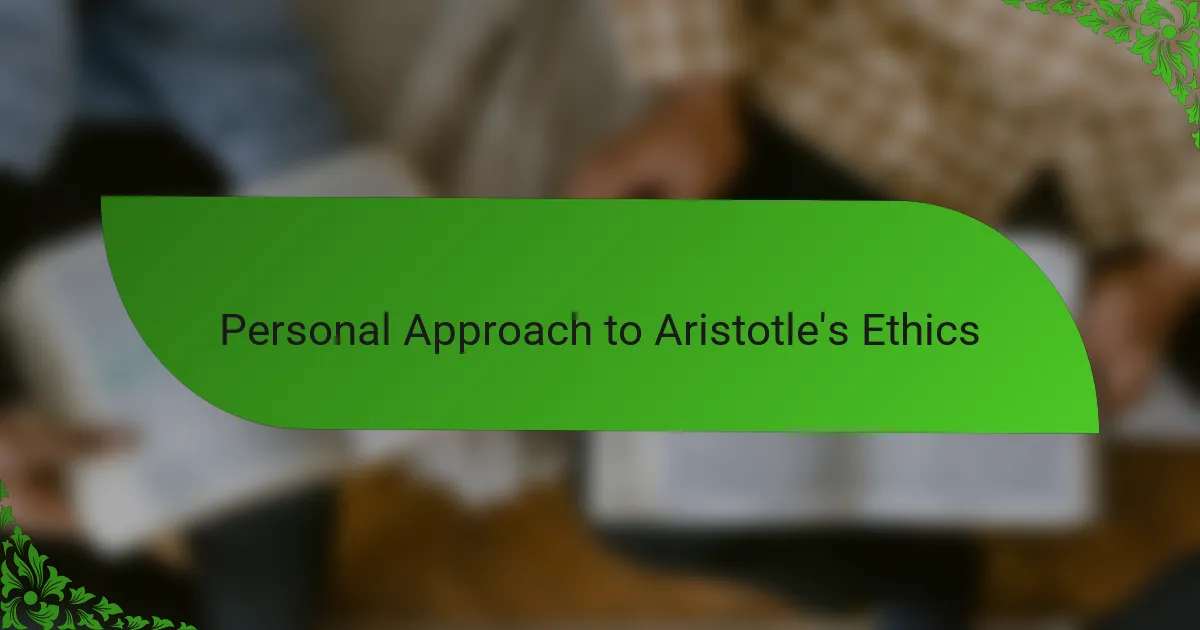
Personal Approach to Aristotle’s Ethics
Approaching Aristotle’s ethics personally, I often find myself returning to the idea of practical wisdom—phronesis—which feels like the heart of applying virtues in daily life. Have I always acted with practical wisdom? Not always, but recognizing its importance encourages me to pause and consider the context before making a choice. This reflection makes the philosophy feel less like a set of ideals and more like an evolving skill I can develop.
I also relate deeply to Aristotle’s notion that virtues shape not only what we do but who we are. For me, this means that ethics isn’t confined to specific decisions but is woven into my character and habits. It’s empowering and humbling to realize that becoming virtuous isn’t about perfection but about steady progress, with setbacks serving as important lessons rather than failures.
At times, I’ve wrestled with finding the “golden mean” in my own actions—how to strike that delicate balance between extremes. When I think about moments of excess or deficiency, I see how those experiences have been instructive, guiding me toward greater self-awareness. Isn’t that the beauty of Aristotle’s ethics? It welcomes our imperfections while encouraging growth toward a flourishing life.

Practical Applications in Teaching
When I incorporate Aristotle’s virtue ethics into teaching, I often focus on creating experiences that help students practice virtues rather than just memorize definitions. For instance, encouraging classroom discussions around real-life dilemmas invites students to reflect on courage, honesty, and temperance in a way that feels vivid and immediate. Have you noticed how students begin to see virtues not as abstract ideals but as practical tools for making daily choices? I certainly have.
Another approach I find effective is modeling virtues myself. It’s one thing to explain Aristotle’s “Golden Mean,” but when I show how I strive for balance in my own behavior, it becomes relatable. This makes me wonder: how much do our actions as educators influence students’ moral development compared to formal lessons? In my experience, demonstrating patience or empathy often leaves a deeper impression than any textbook example could.
I also experiment with habit-forming activities that align with Aristotle’s idea of habituation—small, consistent acts that build character over time. For example, assigning reflective journals where students track moments they’ve practiced honesty or kindness helps embed virtues into their daily lives. Have you tried this kind of reflection? From what I’ve seen, it transforms abstract ethics into a personal journey, making moral growth tangible and doable.
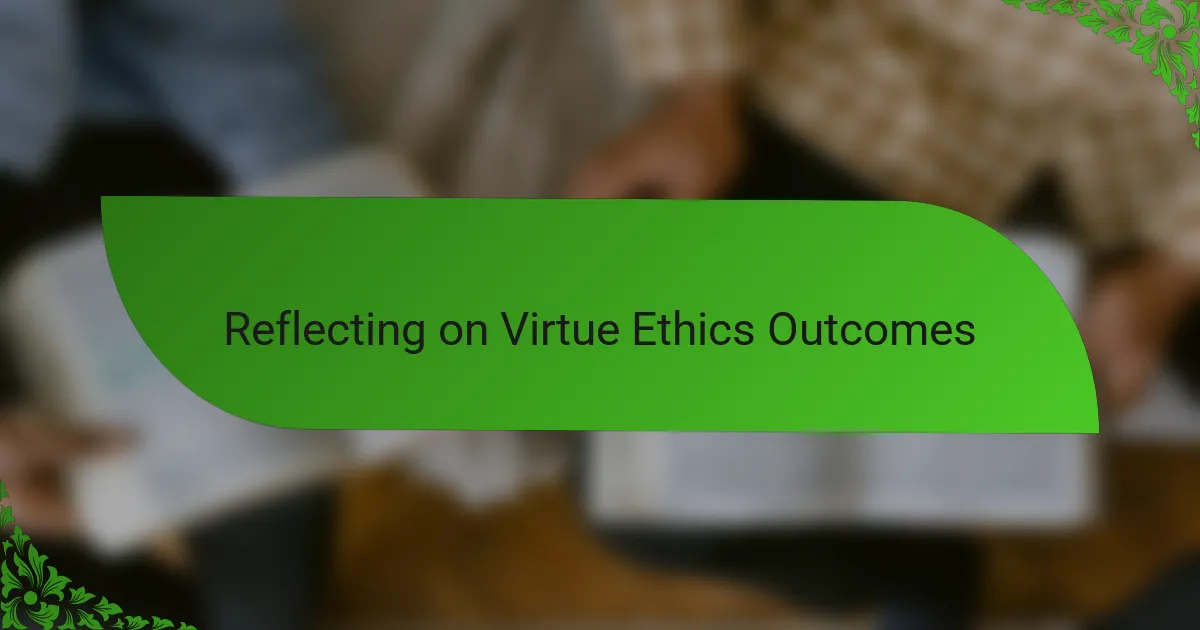
Reflecting on Virtue Ethics Outcomes
Thinking about the outcomes of practicing virtue ethics, I’m struck by how it changes the way I view success in moral terms. Instead of ticking off correct actions, it’s about becoming someone who naturally makes good choices. Have you ever noticed how this shift makes ethical living feel more connected to your own growth rather than external judgment?
At times, I’ve reflected on moments when embodying virtues didn’t result in immediate or obvious “good” outcomes, yet felt deeply rewarding. For example, showing patience during a frustrating situation didn’t always solve the problem, but it strengthened my sense of calm and resilience. Isn’t that a powerful reminder that virtue ethics values the kind of person we become over transient results?
What resonates most with me is how virtue ethics fosters ongoing self-reflection. It encourages asking, “Am I moving closer to the ideal character I want to be?” This question keeps me accountable, not through rules or consequences, but through a personal commitment to growth—a process that feels both challenging and oddly fulfilling.